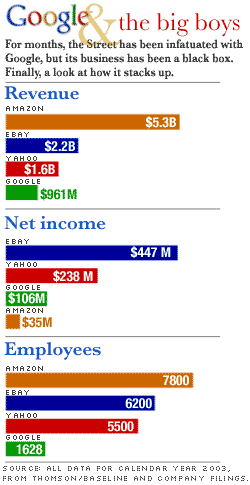NEW YORK (CNN/Money) -
Google stands to gain a sizable amount of money once its shares start trading in a few months. So what should the company do with it?
| 
| |

| 
| 
|

|
 Google will sell shares through the unusual format of an online auction in a bid to make its shares more widely available. CNNfn's Allan Chernoff takes a closer look at what this means for individual investors. Google will sell shares through the unusual format of an online auction in a bid to make its shares more widely available. CNNfn's Allan Chernoff takes a closer look at what this means for individual investors.
|
 Play video
Play video
(Real or Windows Media)
|
| 
|

|
|
In Thursday's initial public offering filing with the Securities and Exchange Commission, the company said it intends to raise as much as $2.7 billion.
Some of that money will be paid to investment bankers Morgan Stanley and Credit Suisse First Boston.
But after underwriting fees and other expenses, the company is still likely to rake in more than $2 billion. And that would be added to the $455 million in cash on Google's balance sheet.
The company had the standard boilerplate language about the use of proceeds in its filing, i.e. money will be used "for general corporate purposes and capital expenditures." Google added though that it might use some of the proceeds to invest in or acquire other companies.
Google goes global
Google has shown a willingness to make acquisitions. The company bought Applied Semantics last year for $102.4 million -- an important deal because it has a technology known as AdSense, which searches through the text of Web pages and allows companies to post relevant ads.
Google disclosed that it also made three small acquisitions last year, for a total of about $15 million.
But since Google will now have more cash at its disposal, as well as lucrative stock to use as currency, the company could expand the pace and size of its acquisitions.
"Google is now on the playing field with a war chest. This puts them in a position to be really aggressive with mergers," said James Lamberti, vice president with comScore Networks, a Web research and consulting firm.
What could Google go after?
Matt Naeger, vice president of operations at IMPAQT, a search engine marketing firm, said he doubts Google would want to stray too far from its core business of Internet advertising. With that in mind, he said Google might want to buy an online direct marketing firm.
Google should be able to easily afford any of the three top publicly traded online ad agencies. DoubleClick (DCLK: Research, Estimates) has a market capitalization of about $1.1 billion, aQuantive (AQNT: Research, Estimates) is valued at just over $600 million and 24/7 Real Media (TFSM: Research, Estimates) has a market value is approximately $125 million.

Lamberti agreed that an online ad agency could be a good move. "It could make sense to acquire a media house. It would help Google harness the full potential of AdSense," Lamberti said.
He added that Google probably will look to expand internationally and that acquisitions are often an easier way to accomplish this. Indeed, Google said in its filing that bulking up internationally is key to its long-term success. And 30 percent of Google's sales in the first quarter of this year came from outside the U.S., up from 26 percent a year ago.
Searching for better results and new products?
But most likely, Google will continue to invest heavily in research and development, said Allen Weiner, a research director with Gartner. Google spent nearly 10 percent of its total sales in 2003 on R&D.
A focus on R&D has helped Google roll out products, such as its Froogle comparison shopping site and its upcoming Gmail e-mail service. And Google will need to maintain this focus since its rivals are also placing a big emphasis on R&D.
Yahoo! (YHOO: Research, Estimates), for example, spent almost 13 percent of its 2003 sales on R&D while Ask Jeeves (ASKJ: Research, Estimates) spent nearly 14 percent.
Google may have an edge in search technology now but it should not be complacent, Weiner said.
"They will need to upgrade the search capabilities to be more personal, targeted and better," Weiner said. "An area of technology they should work on is context of search. So if you type in the world 'Polish' and you're looking for Polish ancestry, you won't get results for car polish."
Lamberti said Google will probably also try and offer more features that are similar to those from rivals Yahoo! and Microsoft's MSN. If Gmail is a success, he said, then a Google version of instant messenger would not be out of the realm of possibility.
But because Google has made a name for itself in search, it's unlikely that Google will seek to become a major content provider along the lines of Yahoo!, MSN or AOL, which like CNN/Money, is owned by Time Warner.
"I don't think Google wants to be anything like Yahoo or MSN," Naeger said. "Google has added Froogle and Gmail but those are types of things that all relate back to the core business of search."

|

